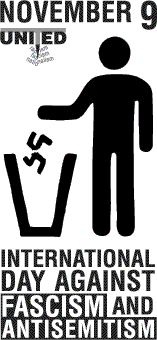 Schicksalstag is a German word meaning, “Day of Fate.” It is used by Germans to describe November 9. Apparently it was first used by some German historians after WWII, but it picked up in popularity after 1989. There are several major events in German history that occurred on this date, with conflicting emotional baggage. However, when you look at a list of events for November 9, you realize this Day of Fate doesn’t stop at Germany’s borders. (Some refer to this date as the "European 9/11" since Europeans write dates with the month after the slash.)
Schicksalstag is a German word meaning, “Day of Fate.” It is used by Germans to describe November 9. Apparently it was first used by some German historians after WWII, but it picked up in popularity after 1989. There are several major events in German history that occurred on this date, with conflicting emotional baggage. However, when you look at a list of events for November 9, you realize this Day of Fate doesn’t stop at Germany’s borders. (Some refer to this date as the "European 9/11" since Europeans write dates with the month after the slash.)Here’s a partial list:
1494 - Medicis expelled from Florence, Italy
1799 - Napoleon overthrew the French government in the coup d’etat of 18 Brumaire
1918 - Kaiser Wilhelm steps down, and Germany’s Republic begins
1923 - Hitler’s failed Beer Hall Putsch
1938 - Kristallnacht/Pogromnacht - German pogrom viewed as the start of the Holocaust
1953 - Cambodia declares its independence
1989 - Berlin wall comes down








2 comments:
I think people already in Dachau in 1935 might disagree that 1938 was the start of the Holocaust. Certainly it signaled the next step in the anti-semitic activities, but the Jews had already lost their citizenship by then (Nuremberg Laws of 1935). I studied at Munich my junior year.
The most amazing thing is the museum in Prague that has all the children's drawings from Theresienstadt and then under all has the death date at Auschwitz of each child.
Dating beginnings can be difficult.
It certainly wasn't the beginning of German anti-Semitism, however "The Holocaust" usually is used in reference to the extermination policy, and sources such as the US Holocaust Museum and the Jewish Virtual Library support its use as a start date.
Post a Comment